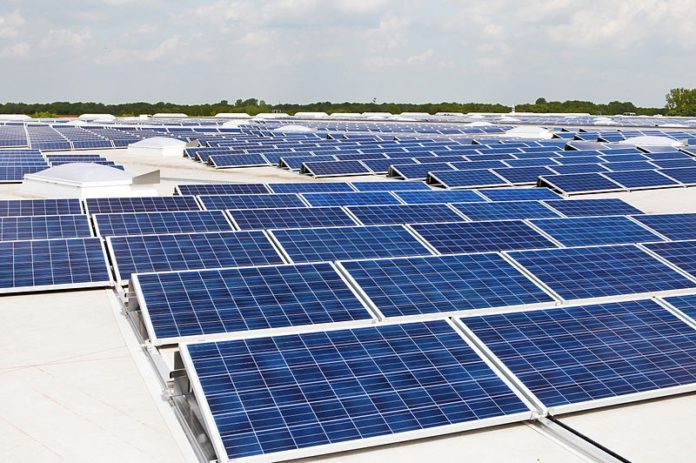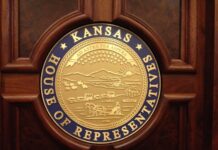(Updated to correct the monthly cost of grid access fee)
The Kansas Corporation Commission’s staff is backing Evergy’s fallback proposal to impose a $35 minimum electric bill to help recover the cost of demand that it says solar-powered homes place on the electric grid.
Evergy had proposed a minimum utility bill as an alternative to a grid access fee of $3 per month per kilowatt, or roughly $20 a month for solar users.
But the KCC staff recommended the minimum bill, fearing the grid access fee would violate a state Supreme Court ruling that found utility companies can’t charge homeowners more than other consumers for using solar panels to produce energy.
In testimony filed with the KCC, the agency’s staff noted that the grid access fee would only apply to solar customers, potentially creating a discriminatory pricing model.
“The minimum bill applies to all residential customers equally,” wrote Robert Glass from the KCC’s utilities division.
“Compared to the grid access charge, staff views the minimum bill as a lower-risk option that is indisputably nondiscriminatory by way of its application to all customers.”
Meanwhile, the Citizens’ Utility Ratepayer Board and the Sierra Club are urging the KCC to reject both the grid access fee and the minimum $35 bill.
Both organizations said the minimum bill proposal would affect low-income utility consumers who use less power, although the KCC staff proposed some changes to address that issue.
Evergy is looking for an alternative to a demand fee levied against solar customers that was struck down by the state Supreme Court earlier this year because it was discriminatory.
The court said the Kansas Corporation Commission erred by approving the charge, which environmentalists called “morally and economically unfair.”
It sent the case back to the commission for further consideration.
Evergy assessed the original demand fee — $3 per kilowatt a month in the winter and $9 per kilowatt a month in the summer — saying that solar users should pay for their share of maintaining the power grid.
The utility contended that just because a customer conserves energy doesn’t mean lower fixed capital costs, such as investments in power plants, poles, meters, billing and customer service, for the company.
While solar customers purchase less energy, the cost of serving those customers does not decline by a corresponding amount, the utility has argued.
The company doesn’t believe the access fee is discriminatory because solar customers have different consumption patterns by exporting and importing power to and from the grid.
“It is well-established under Kansas law that customers who use utility facilities differently may be charged different rates,” Evergy consultant Ahmad Faruqui wrote in testimony filed with the KCC last month.
He said state Supreme Court precedent has established that a rate is only discriminatory if solar consumers are charged a higher price than nonsolar customers for the same service.
However, a coalition made up of the Climate and Energy Project, the Sierra Club and Vote Solar, said in a filing that the grid access charge does discriminate against solar users.
“The fundamental problem with the company’s proposed grid access charge is that it discriminates by charging (solar) customers more for the electricity they receive
from the company than a (nonsolar) customer would pay for the exact same level of
electricity,” consultant Rick Gilliam, wrote for the coalition.
Testimony filed with the agency said that under the minimum bill proposal, a customer using less than 278 kilowatt hours would pay $35 a month.
Customers using more than 278 kilowatt hours would see no change because their bill would be above the $35 minimum.
“Therefore, Evergy’s minimum bill proposal would only impact lower usage customers with the actual impact dependent upon the level of monthly usage,” wrote Brian Kalcic, an economist and consultant for the Citizens’ Utility Ratepayer Board.
“The lower a customer’s usage, the greater the customer impact,” Kalcic wrote.
The KCC staff said it believed some residential customers who live in smaller dwellings would be unintentionally harmed by a $35 minimum bill across the board.
So the staff said Evergy should consider having at least three residential groups
with each having its own minimum bill.
It suggested that the residential groups be broken down into customers with houses, customers with apartments, and customers who live in mobile home parks.
“However, without data, it is difficult to determine what the minimum bill should be for each of the three residential groups,” the KCC said.
The minimum bill would affect about 195,000 of Evergy’s 610,619 nonsolar customers in the old Westar service area, according to testimony from the coalition of the Climate and Energy Project, the Sierra Club and Vote Solar.
Evergy, the coalition’s consultant said, effectively wants to raise utility rates on 200,000 nonsolar customers because it believes roughly 800 solar customers aren’t paying their fair share.
“Increasing cost recovery from one-third of Evergy’s customers through a minimum bill policy without reducing other charges,” Gilliam wrote, “will produce more revenue than authorized in the rate proceeding.”
The coalition contends that raising electric costs for some power users runs counter to a moratorium on base rate increases that doesn’t lapse until the end of 2023.
It argues that the KCC would have to account for the increase at a later time when it could address the overcollection of rates from customers.















